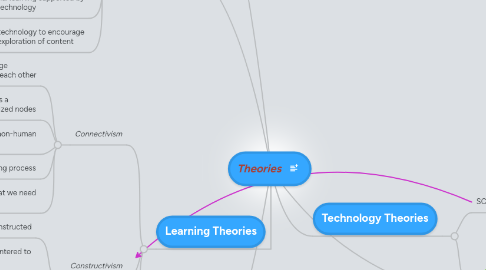
1. Behaviourism
1.1. the emphasis of this theory is placed on learning and improving learning
1.2. Responses to distinct stimuli
1.3. Emphasis on positive and negative reinforcements to alter behaviour
2. Learning Theories
2.1. Connectivism
2.1.1. A learning theory for the digital age Thinking and emotions influence each other
2.1.2. Learning has an end goal and is a process of connecting specialized nodes
2.1.3. Learning may reside in non-human appliances
2.1.4. Learning is a knowledge creating process
2.1.5. Allows us to learn what we need for tomorrow
2.2. Constructivism
2.2.1. Human learning is constructed
2.2.2. shift from teacher centered to student centered
2.2.3. there is no "blank slate" when it comes to learning, because everything is constructed and based on experience
2.3. Cognitive Load
2.3.1. Information processing theory
2.3.2. Our minds have structures such as working memory, long term memory, and schemas
2.3.3. Three types of "cognitive load"
2.3.3.1. Extraneous, Intrinsic, and Germane
3. TPACK
3.1. Teaching Pedagogical Content Knowledge
3.2. The knowledge teachers need to teach effectively with technology
3.2.1. Emphasis on content, knowledge, and technology
3.2.1.1. emphasis on the relationship between these components
3.2.1.2. Very situation specific; will not apply to all teachers
3.2.1.2.1. demographics, culture, grade level,ect
3.2.1.3. emphasis on the connections that are made when these areas overlap
3.3. essential learning supported by good technology
3.4. use technology to encourage the exploration of content
4. Philosophy of Teachnology
4.1. Students must be literate and familiar with the technology before it can be used to its full potential
4.2. technology changes the way we live and think, and in some cases learn
4.2.1. allows access to diverse skills and knowledge
4.3. encourages students to take risks that they may not have considered with "generic" learning
4.4. illustrates individuality and our connections to others
4.5. The teacher is now also a mediator, facilitator, and a monitor (in online learning activities and exploration)
4.6. Not all teachers and students have constant (or any) access to the latest technologies
5. The study of media environments
5.1. Tries to find out what role media farces us to play
6. Technology Theories
6.1. SCOT
6.1.1. Advocated by social constructivists
6.1.2. technology does not determine human action, human action shapes technology
6.1.3. the ways a technology is used cannot be understood without understanding how the technology is embedded in the social context
6.2. Media Ecology
6.2.1. modes of information and codes play a role in human affairs
6.2.1.1. How media affects perception, emotion, and value
